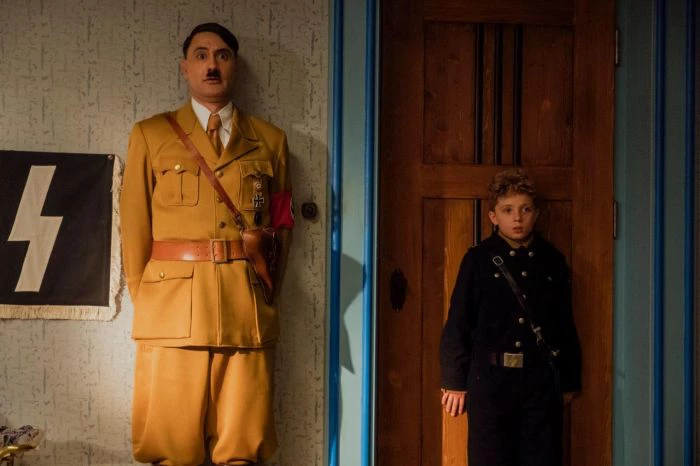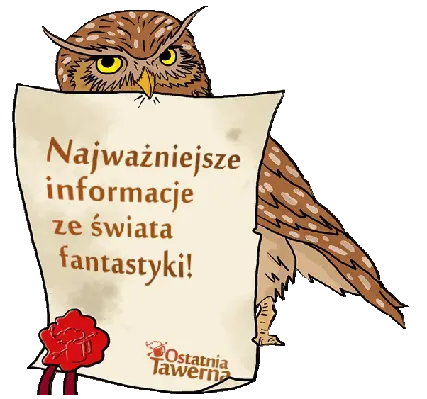Here is Jojo. Jojo is 10 years old and a proud Nazi. He diligently attends Jungvolk’s operational meetings, cares for his sword and dreams of going to the front and fighting for a good cause – to win the sympathy and friendship of his greatest idol, the great leader of the Third Reich. Or at least he thinks so. However, when an unfortunate accident blurs these plans, and the boy himself discovers an unexpected… guest in his home, Jojo (Roman Griffin Davis) is forced to confront his beliefs with harsh reality. This one may not be colorful, but Jojo is not alone. He is supported by his best friend – Adolf (Taika Waititi).

At the outset, I must confess something – I was going to the cinema for the first screening of Jojo Rabbit (do you remember something else?) Full of anxiety. Taika Waititi’s bizarre, absurd humor appeals to me the most, but I had some doubts as to whether the style of the artist, otherwise interesting and promising, would work for this type of story (especially since the New Zealander’s interpretation definitely differs from the adapted source material of the novel Niebo na tiezi Christine Leunens). Fortunately, these fears were not confirmed, so I was pleased to hear the film again as soon as it first appeared on VOD, and then – by Galapagos Films – on a number of home media.
It is worth recalling that the creator has by no means reinvented the wheel here. The blade of satire at the Nazi apparatus was aimed at the Nazi apparatus as early as 1940 by Charlie Chaplin in The Dictator , exposing his contemporaries to the absurdity of the hateful ideology, trying to bluntly prove that the Führer is in fact naked. However, we partially meet the perspective of a child in Life is BeautifulRoberto Benigni. It is not difficult to guess that Waititi seems to draw from these titles as well, but does not limit himself only to his own grotesque play. Instead, he skillfully uses contrast, smoothly interweaving comic sketches with dramatic scenes, often grabbing the viewer’s heart and throat. Every now and then, it reminds us of constant vigilance – the dangers related to the historical context of the story do not cease to exist only because the Great Leader (or rather, as the boy blinded by propaganda imagines him) puts a unicorn roast at dinner, and pure evil is embodied in exaggerated, caricatured demonic noses led by the same man who gave the world the Office .
In this regard, Jojo Rabbitdiffers from the director’s work to date. It is because neither the eccentric characters nor the ridiculous situations they provoke are ridiculed (although these also become the source of a few rather good-natured jokes and slapstick gags). The real goal of satire is the very oppressive narrative of Nazi propaganda and the blind fanaticism of its followers. Despite the sketch structure of the sequences, it is impossible not to read the decidedly pacifist tone of the story. This particularly intensifies in the sequence of the town’s siege, very suggestively confronting the boy with the highest cost of war, previously imagined as a great adventure – a meaningless, cruel and bloody face. Waititi does not hide his sympathies; the scarf is unambiguously tilted towards the girl hiding in the attic (which should not be surprising, as the director himself has Jewish roots), a torn mother (Scarlett Johansson), unsuccessfully trying to temper the aspirations of a small fanatic and dismissing the known ideology of Captain Klenzendorf (masterful role of Sam Rockwell), not so subtly revealing his non-heteronormative identity * himself and his partner Finkel (Alfie Allen). Especially in the case of the latter, however, there is a serious dissonance; although for Jojo he becomes a figure of a father – protector and protector, we – aware of the historical context – still cheer for the representative of the murderous regime, remaining a cog in the deadly machine, and finally ready to die in her name, even if he does so without conviction, just forced by circumstances. a torn mother (Scarlett Johansson), unsuccessfully trying to temper the aspirations of a little fanatic and dismissing the known ideology of Captain Klenzendorf (masterful role of Sam Rockwell), not so subtly revealing his non-heteronormative identity * and his partner Finkel (Alfie Allen). Especially in the case of the latter, however, there is a serious dissonance; although for Jojo he becomes a figure of a father – protector and protector, we – aware of the historical context – still cheer for the representative of the murderous regime, remaining a cog in the deadly machine, and finally ready to die in her name, even if he does so without conviction, just forced by circumstances. a torn mother (Scarlett Johansson), unsuccessfully trying to temper the aspirations of a little fanatic and dismissing the known ideology of Captain Klenzendorf (masterful role of Sam Rockwell), not so subtly revealing his non-heteronormative identity * and his partner Finkel (Alfie Allen). Especially in the case of the latter, however, there is a serious dissonance; although for Jojo he becomes a figure of a father – protector and protector, we – aware of the historical context – still cheer for the representative of the murderous regime, remaining a cog in the deadly machine, and finally ready to die in her name, even if he does so without conviction, just forced by circumstances. unsuccessfully trying to temper the aspirations of a small fanatic and disrespectfully contesting the known ideology of Captain Klenzendorf (the masterful role of Sam Rockwell), not so subtly revealing his non-heteronormative identity * and his partner, Finkel (Alfie Allen). Especially in the case of the latter, however, there is a serious dissonance; although for Jojo he becomes a figure of a father – protector and protector, we – aware of the historical context – still cheer for the representative of the murderous regime, remaining a cog in the deadly machine, and finally ready to die in her name, even if he does so without conviction, just forced by circumstances. unsuccessfully trying to temper the aspirations of a small fanatic and disrespectfully contesting the known ideology of Captain Klenzendorf (the masterful role of Sam Rockwell), not so subtly revealing his non-heteronormative identity * and his partner, Finkel (Alfie Allen). Especially in the case of the latter, however, there is a serious dissonance; although for Jojo he becomes a figure of a father – protector and protector, we – aware of the historical context – still cheer for the representative of the murderous regime, remaining a cog in the deadly machine, and finally ready to die in her name, even if he does so without conviction, just forced by circumstances. Finkel (Alfie Allen). Especially in the case of the latter, however, there is a serious dissonance; Although for Jojo he becomes a figure of a father – protector and protector, we – aware of the historical context – still support the representative of the murderous regime, remaining a cog in the deadly machine, and finally ready to die in her name, even if he does so without conviction, just forced by circumstances. Finkel (Alfie Allen). Especially in the case of the latter, however, there is a serious dissonance; although for Jojo he becomes a figure of a father – protector and protector, we – aware of the historical context – still cheer for the representative of the murderous regime, remaining a cog in the deadly machine, and finally ready to die in her name, even if he does so without conviction, just forced by circumstances.
The same applies to the audiovisual level. Lively music and symmetrical, colorful frames (similar in form to the expressive works of Wes Anderson and Edgar Wright) emphasize the infantile perception of the world by the main character. Along with the changes taking place in the boy’s head, the visuals also seem to change a bit; The colors seem to fade a bit, grays creep in here and there, and the joyfully playing Beatles are replaced by calmer, sometimes even poignant musical illustrations. Waititi made every effort not to leave any loose threads. Even inconspicuous, surreptitious jokes that seemed to be ordinary stuffed up at the moment (such as the one about the German Shepherd Hound) find their point in the form of visual gags or easily overlooked details,

The DVD edition distributed by Galapagos Films does not include any extras – we have to look for these on a slightly richer Blu-ray edition. The distributor took care of the wealth of language versions. Thanks to this, we will watch Jojo Rabbit not only in the original or with a Polish voiceover, but also with Czech or Hungarian sound. We can also choose from a dozen or so subtitle translations, incl. Bulgarian, Croatian or Greek. The disc is packed in a standard plastic box; the distributor was not tempted to prepare an edition in the form of a booklet with behind-the-scenes tidbits that could compensate for the lack of additional materials on the disc itself.
As I have already mentioned, I was a bit afraid of this screening. That Waititi will simply rush by taking a delicate topic too lightly. Moreover, not everyone will be satisfied with the convention of telling about the nightmares of war through the eyes of a kid blinded by fanaticism – in the form of a black, not always tactful comedy with a slightly didactic flair. An unusual concept may seem as much a curiosity as a disadvantage – those who expect chronicle historical accuracy will probably find that perhaps too little emphasis is put on exposing the harms of armed conflict and hate propaganda, too much to forcing certain more or less dry jokes (those who write these words are mostly laughing,Summa summarum , Jojo Rabbit remains an expressive voice in the relevant discussion, due to the extremes that appropriate discourse and public space – still terrifyingly relevant. Reading may not be entirely perfect, but it is absolutely obligatory.
* Which seems to partly explain Klenzendorf’s loose attitude towards Nazi principles – homosexuals were persecuted in the Third Reich to the same extent as people of Jewish origin.

